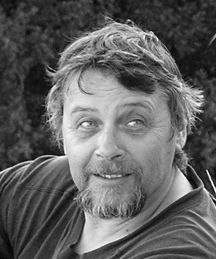
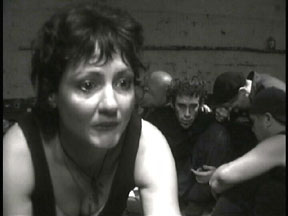
"Tragos" (2000; 105:00) a cyber-noir
PHIL HALL: It's easy to list the obvious advantages and disadvantages of being an independent filmmaker--the joy of self-expression, the scramble to raise funds, etc. But what are the less-than-obvious advantages and disadvantages that you've encountered in your work...issues and concerns that you may not have considered before pursuing filmmaking?
ANTERO ALLI: Since I favor an impartial use of multiple mediums (film, video, animation, etc), I view myself more as a mediamaker than a filmmaker, per se. In my case, it's a relevant distinction, as well as, a nod of respect to those working exclusively in film. The advantages to making my own media are both simple and severe. I either do it or die, or worse yet: numb down in that dismal, dreary, consumer sort of way. Sometimes I feel driven by a vengeance for forcing visions upon the world; visions and impressions that have been assaulting my sensibilities for a long time.
Mediamaking suits this obsession very well and I think that's got to be the main advantage for me. The chief disadvantage, which may be a dare in disguise, is succumbing to any economic and cultural pressure to compromise your work (and how it's publicized) by conforming to externally defined values, categories and genres. This clearly sucks. If you've been lucky enough to make this mistake in a way that really hurt you and if you are smart enough not to repeat the error, you can turn this disadvantage to your favor. The greater the disillusionment, the greater the clarity afterwards...the way of the world.
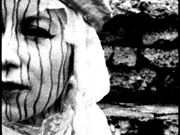
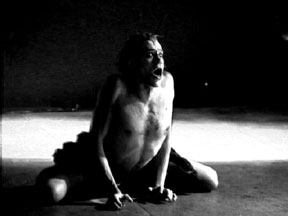
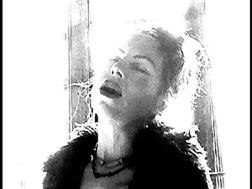
"Under a Shipwrecked Moon" (2003), "Orphans of Delirium" (2004), "Hysteria" (2002)
PHIL HALL: Your films deal with some very troubling subjects--alienation, the breakdown in interpersonal communications, people pushed to emotional extremes. Yet your films are never heavy nor depressing. How do you address these mature subjects without getting weighed down in Bergman-style doom and gloom?
ANTERO ALLI: Probably because I'm not nearly that good yet. Bergman's a genius and he referred to Andrei Tarkovsky, one of my favorite filmmakers, as a kind of teacher; if you've seen his work, you'll know why. The pacing, the texture, the editing and the real time captured in each frame of Tarkovsky's films breathes with so much exquisite gloom it almost brings dying back into style. I die every time I see his epic, "Andrey Rublyov" or his last film, "The Sacrifice." A kind of ego-death, if you will, that allows for a more fluid passage of real time, the time of my life, to unfold. My own personal style tends more towards the glib and the arch, no matter what the subject matter.
I treat my themes as truthfully as I can. And as I see it, the truth is serious enough as it is; why leaden it any more? This is a complex question due to what I believe to be the subjective nature of truth. What is worth filming or creating a movie about? What is worth saying that has not been said before in a more effective way? It's a humbling process, coming to terms with what and how to write, shoot, direct and edit but that's how it should be. Otherwise, it may not be worth watching.
PHIL HALL: You've made documentaries and dramas, features and shorts. Which genre do you prefer to work in... or do you prefer not being restricted to a single genre?
ANTERO ALLI: This usually depends on what I need to learn next. For example, I might approach a documentary after completing a project that was, for me, a deeply creative and personal vision. There's this need to utterly immerse myself in my own world, as much as there's an equal need compelling me to be free of that world. Some projects are more identity-defined, while others are more devotional to something other than myself. I go for that long-term kind of balance. I also choose projects based entirely on who I get to work with. I've also been known to sign up six months of my life for a new technical challenge, such as an opportunity to edit on equipment I've never used before.
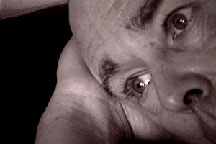


"Fears" (text, R.M. Rilke), "Fairy" (text, A. Rimbaud) and "Witch Burning" (text, S. Plath)
PHIL HALL: You've created films based on the works of Rilke, Rimbaud, Plath--not really the traditional source of cinematic adaptations. What draws you to filming literary works which most filmmakers would not consider?
ANTERO ALLI: Besides being a lover of great poetry, it's easy for me to think of cinema in poetic terms. I'm intrigued by the use of poetic text as oblique narrative. In my first feature, "The Oracle" a grandfather character is on his deathbed and talking in his sleep. His daughter and the nurse sit there dumbfounded, as his words form these poetically precise questions (from Pablo Neruda's "Book of Questions"); cut to a bardo-like afterlife scene where his nine year-old granddaughter guides him through the dark woods. With Rilke's "Requiem For a Friend," the challenge was to narrate the epic lament as a story, not a poem. To keep it cinematic and theatrical, it's important to break down conventional ideas about poetry and how poems should be read and find instead, the story in the poem.
PHIL HALL: Your films are primarily seen by audiences in alternative venues which specialize in smaller films, especially those shot on video. But when you consider the economics of film exhibition, do you believe these alternative venues and their eclectic fare can ultimately compete (from an economic, not an artistic standpoint) against the multiplexes?
ANTERO ALLI: I don't think there is any real competition between these levels, especially if we're talking about work that aspires towards commerciality and respectability in that consensus mainstream Hollywood sort of way versus work with little or no commercial value whatsoever. Since my own work leans heavily towards the latter, I don't feel the heat of competition as much as the appreciation from those who seek out alternative media and the fringe-dweller values that define it. Besides, I dig the view from the outer limits, the margins.
PHIL HALL: All filmmakers encounter negative criticism, and you have not been immune to critical rebuke. "The Drivetime" was dismissed by the Amazing World of Cult Movies (now defunct) as a "silly mess" and you were equated with being "a ninny." How do you react to harsh criticism, from both an artistic and an emotional standpoint?


"The Drivetime" (1995; 85:00) a cyber-fi feature
ANTERO ALLI: Though I often remind myself that any review is only one person's opinion, harsh reviews always hurt. What are you going to do? Stop reading all your reviews? That's just more self-stabbing victim bullshit. Why not pick up some objectivity and identify the bias of the reviewer just to see where they are coming from? Just for fun. When I do this, it's understandable why The Amazing World of Cult Movies calls me a "ninny" and my movie a "silly mess". That's very funny. If I were as cynical and jaded as them, I'd probably say the same thing.
To confound things, "The Drivetime" was also given glowing reviews by Wired Magazine, the Pacific Film Archive and the NW Film Forum and these guys didn't even call me names. Of course, their bias and outlook are, for the better part, already more aligned with my own. And I like that. If they had trashed my movie, I'd probably feel more hurt than the cynic who called me a ninny. For me, the best reviews are instructive and these are very, very rare. Most film critics have seen too many movies and suffer imagination loss, in addition to having weakened their critical judgement for constructive praise. That's a mouthful. The worst reviews must be the most indifferent reviews and, knock on wood, I've not seen one for my work yet.
PHIL HALL: Critics can elevate a smaller film to unexpected success (i.e., "The Full Monty" and "The Blair Witch Project"), but they can also eviscerate a film into financial failure. As a filmmaker, how do you view the power of the critics?
ANTERO ALLI: Of course, critics can make or break a show in terms of sheer audience attendance; that's their godawful power and responsibility. As for myself, I usually go see those films that have elicited at least two opposing reactions from different newspapers. Why? The best work always confounds genres. It outgrows previous genres while mutating its own. Unless critics are still capable of creative thought, they will tend to pan a movie they cannot pigeonhole and, often enough, to justify their own pet dogmas. In my own mind, critics only have the power I give them and from my ranting, you know that's not very much. In the real world, however, critics are media gods blessing and cursing the fates of filmmakers everywhere.
PHIL HALL: What advice would you give to aspiring filmmakers and aspiring film critics?
ANTERO ALLI: I have no advice at all for aspiring filmmakers but heartfelt discouragement. If you cannot or will not throw yourself into this crazy-making process with all your will, heart, guts, mind, soul and money, then you will never know what it means to realize your dreams in this medium. This medium does not treat half-baked attempts kindly. Most movies demonstrate this in living Technicolor. Here's a warning for you: I go a little more crazy with each and every project but it is going crazy in the name of creation, not destruction. And that kind of crazy I can live with and, live for. As for critics, there may be no hope unless you find ways to teach us as you criticize. You may be able to do this if you commit to learn new ways to keep learning. Know your bias. It always shows, anyway, and you suffer less when you are not the last to know.
excerpted from the book
THE ENCYCLOPEDIA OF UNDERGROUND MOVIES by PHIL HALL
(2004, Michael Weise Productions)











